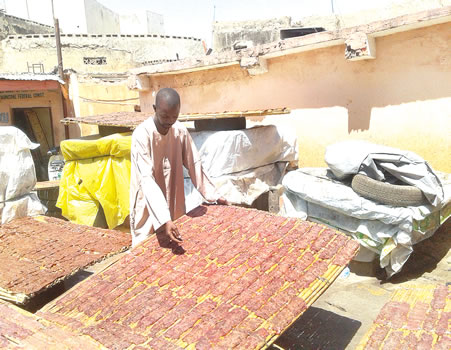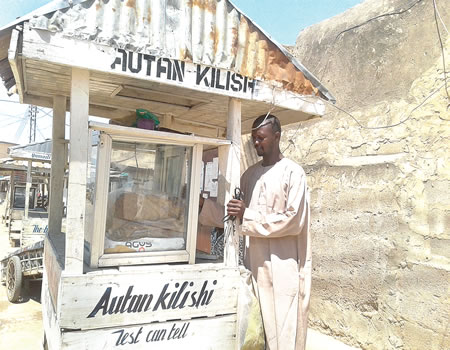KILISHI, the popular dry meat snack, is not only loved in the Northern part of the country, it is also loved all over the country. For most travellers from other parts of the country, coming back home from a trip to the north without kilishi is an incomplete journey. The delicacy is the certificate or proof that the person had indeed embarked on a journey to the northern part of the country. It is a delicacy many look forward to receiving as gift from a traveller to that part of the country.
Kilishi in fact derived its popularity from the famed culture of African hospitality of giving out gifts to visitors to give their relations back home. Apart from being sold and eaten by people in the community, it is also given out as gifts.
However, kilishi is not native to the north. It actually originated from Niger Republic, Nigeria’s neighbour to the north. It was brought to Nigeria by Nigeriens who settled in Kano at a place called Agadasawa quarters, in the central part of the ancient city. Till date, it is the place where anyone could find the best kilishi. Agadasawa has remained the place where the best of the delicacy is being produced.
On both sides of the road in Agadasawa, kilishi is displayed in kiosks displaying different names, where the snack is often packaged in small or big plastic nylons with their prices from N20 and above attached to them. It has become a big business because of the huge patronage it is receiving from Nigerians and foreigners alike.
Abdullahi Agadasawa, a kilishi seller in an interview with Sunday Tribune confirmed that the dry meat delicacy business is indeed lucrative whose knowledge is even being passed down from parents to their children. In his own case he said it was a business his father happily taught and handed over to him.
“I inherited this business from my father and guardian. For over 150 years, our great grandparents have been engaged in the business here in Agadasawa. Our children have equally learnt the business.”
Abdullahi, while taking Sunday Tribune through the production process said there are other meat snacks competing with kilishi like suya and dambu but there is a clear difference.
According to him the difference between kilishi and dambu nama for example is that the meat is sliced after which it is spread on a mat made of raffia and sun-dried for a day or two.
After that a mixture comprising seasoning, dry pepper, onion, ginger, garlic and groundnut oil is put in a big bowl. The kilishi would then be soaked inside the mixture. It is after this that the meat product is dried in the sun again and roasted on hot charcoal for at least three minutes.
On the other hand, dambu nama is cooked lightly just to reduce the toughest of the meat and then pounded in a mortar. It is then spread on a tray.
The dambu is later fried a little and the oil allowed to drain. The product is then packaged and sold just like kilishi or suya.
According to Abdullahi, kilishi, originally, was exclusively produced for royalties, emirs and members of royal court. Though they normally would not eat it, they often gave it out as gift to their visitors.
Aside that, whenever the royalties travelled out of domains, they took along with them Kilisi which they present to their hosts. Through these gestures, kilishi began to be popular in different parts of the world.
Speaking in the same vein, Malam Hassan Agadasawa, a major kilishi producer and seller, said drying the meat in the sun and adding spices to it bring out the flavour and make it to last without getting sour or losing taste.
“After the production process is completed, kilishi can last for a period of nine months” he said noting that making kilishi is a tedious process.
Malam Hassan, however, noted that there is need to acquire modern equipment for mass production of the delicacy, though he admitted that traditional method could not be matched in terms of producing tasty kilishi.
“Take it or leave it, the traditional way of making kilishi is the best because if one adopts the modern way, much of it would get burnt and it will lose taste,” he explained.
Challenges facing the business
The most important challenge facing the business according to the vice chairman, Agadasawa Kilishi Processors, Alhaji Garba Sule Autan, is where the business is done.
“The place where we were doing this business is too small. We need a bigger accommodation. As you know, times are changing. We are interested in acquiring modern equipment, which would not only modernise our business but also boost our output,” he said, adding that lack of capital is another major problem confronting them.
“Lack of enough capital is another problem. If government can assist with enough capital and modern equipment, kilishi can be sold extensively, locally and internationally and through tha, job opportunities would be open for many youths roaming the streets in search of white-collar jobs. Aside that, government’s internally generated revenue would also receive a boost,” Alhaji Garba said with some air of confidence.
Overall Kilishi is a lucrative business for those who produce it. To them, no other business is more rewarding, financially and that is why it has become a business that is being passed down from one generation to the other.







